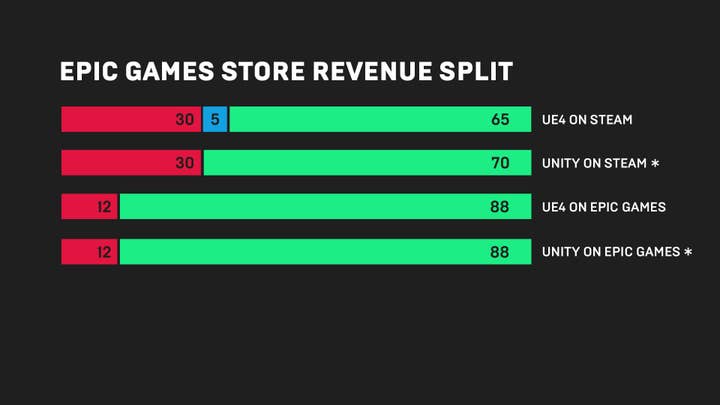If 30% is too high, what's the right number? | Opinion
As authorities investigate Apple's share of App Store revenues, there's broad agreement that 30% is too high -- but there's little consensus on an alternative number
Earlier this week, Apple CEO Tim Cook faced questioning from US lawmakers on Capitol Hill -- a very public moment in an ongoing probe into whether major technology companies have used monopoly power to engage in anti-competitive behaviour. While much of the focus in the probe is on the approach of companies like Google and Facebook to the dissemination of political views, propaganda and disinformation, in the case of Apple a large proportion of the lawmakers' questions focused instead on the App Store, and the question of whether Apple is abusing its gatekeeper role over software on the iOS platform.
This is an issue pretty close to the heart of a number of key people in the games business -- perhaps most of all Epic Games' Tim Sweeney, who has been consistently outspoken on the question of the 30% revenue share that Apple, in common with most other digital distribution platform operators such as Google and Valve, takes from transactions on its platform.
Companies across the tech industry have tacitly or overtly welcomed the investigation of the App Store by the US government
Epic's own Games Store seems largely designed as a challenge to that revenue share, taking only a 12% cut of each transaction. But while setting up an entirely separate distribution platform -- and inviting constant brickbats from inexplicably outraged consumers for having the nerve to actually try to compete with Steam -- is perhaps the most dramatic way in which anyone has expressed their disapproval of the 30% industry standard, Epic is far from being alone in disliking this toll. Companies across the tech industry have tacitly or overtly welcomed the investigation of the App Store by the US government and a parallel investigation by the EU, with some even going so far as to directly contact the investigating authorities about their grievances.
The question of whether government authorities are likely to find against Apple is a complex one, though few people I've spoken to -- including some very harsh critics of the 30% toll -- think it's terribly likely that national or supra-national authorities are going to be willing to step in. Apple will point out, as Tim Cook did on Wednesday, that the company doesn't have a majority share of the smartphone market anywhere, and that his company's pricing is in line with that of its competitors -- that, in fact, the 30% share has held as a broad industry standard even on platforms where there's market competition between distribution platforms.
It will no doubt also point out that the thriving App Store ecosystem and the multi-billion dollar companies who operate on it is in itself a refutation of any notion that businesses can't survive this kind of tariff, and moreover, that the services Apple provides -- not just the hardware platform but the software, development tools and APIs, discovery services and so on -- clearly offer some value or those companies wouldn't be there in the first place. However much you dislike the 30% charge, it's hard to argue that those aren't compelling reasons for any moderately free-market minded government to decide its intervention isn't needed or wanted here.
Apple will point out, as Tim Cook did on Wednesday, that the company doesn't have a majority share of the smartphone market anywhere
On the other hand, though, it's equally hard to argue that 30% doesn't seem like a hell of a lot to charge -- especially since the dominance of free-to-start and subscription models on the App Store means Apple is generally getting a cut (granted, not always 30%) of lifetime revenues, not just of the initial transaction through the App Store interface. Moreover, it's undeniable that free market forces aren't really in play here; there's no actual price discovery happening, Apple is merely acting as a gatekeeper to hundreds of millions of high-value consumers and telling people to pay the charge it's unilaterally decided upon or go away.
Yes, businesses clearly can survive a 30% toll on their activities on iOS -- and Android, and Steam, and so on -- but that doesn't mean they should have to. And while the argument that the pricing power held by a company like Apple is entirely down to the quality of its offering may be enough to convince governments that there isn't a sufficiently clear-cut case for intervention here, the reality is that there is absolutely a degree to which that 30% cut is sustained through leveraging things like the company's successful hardware sales and the platform lock-in of consumers rather than being a natural reflection of the value they provide to developers.
Even if we agree that 30% of lifetime revenues is a hell of an ask from a platform holder -- which, honestly, I suspect most people outside of those platform holders do -- a major part of the problem here is that there's a very obvious follow-up question to which there isn't a particularly good answer yet. If 30% is the wrong number, what's the right number? Epic, to its credit, has at least pinned a tail on the donkey here with its own 12% figure, but the vast majority of other firms who have joined in criticism of the 30% share have been entirely silent on the question of what they think would actually be a reasonable number.
Yes, businesses can clearly survive a 30% toll on their activities, but that doesn't mean they should have to
One reason for that is because at the point where this all becomes a discussion about how much value Apple, Google et al are adding with their distribution services, and thus how much it's reasonable for them to charge, the whole thing effectively turns into a pretty detailed price negotiation between large corporations -- which governments are far less likely to want to intervene in.
It's also, bluntly, a bit of a "how long is a piece of string" discussion. It's extremely hard -- perhaps impossible -- to look at the various things a company like Apple does in terms of setting up, developing, operating and promoting not just the App Store but the whole notion of iOS as a platform for third-party developers, and come up with a percentage value for what that's "worth". Apple says it's worth 30%. Epic thinks it's worth 12%. Given the complexity of what lies behind them, both figures feel somewhat like they were pulled out of the air.
Another reason why so few people are willing to say what they think a fair number would be, however, is a bit more dramatic; it's that they're actually of the view that the fair number is zero, at least for certain types of content, software or transaction. There is a school of thought which says that Apple makes money from charging users for premium hardware -- and to some lesser extent, services like iCloud, Apple Music or Apple Arcade -- and the App Store ecosystem is an important part of what iOS devices actually offer to those users. Apple shouldn't be seeking to make so much money from developers on that platform, which essentially amounts to double-dipping.

The extreme view says they shouldn't be charging anything at all. More toned-down versions object specifically to charges for some kinds of transaction, especially ongoing microtransactions and subscriptions.
Whether it's remotely likely that an investigation might end up forcing app store operators to make this kind of change to their policy by zero-rating some or all transactions is hugely questionable -- but it's worth thinking for a moment about just what a can of worms this would potentially open up. Not losing a chunk of your iOS revenue to Apple and a chunk of your Android revenue to Google is an immensely appealing prospect in terms of any company's bottom line, but if that cut actually gets reduced to zero, it introduces some pretty clashing priorities and goals to the equation.
If that cut actually gets reduced to zero, it introduces some clashing priorities and goals to the equation
It's entirely true that these companies mostly want consumers to use their hardware and operating systems, with the app stores being just one of the big selling points along the way. But at the moment, the stores also generate a significant amount of income for these companies, creating a balancing incentive between their desire to create what they consider to be the optimal experience for consumers, and their desire to allow developers to maximise revenues for both themselves and the platform holder.
This may sound a little like blackmail -- nice app distribution channel you've got there, it'd be a shame if something were to happen to it -- but it's a reality that the revenue share creates an aligned interest between these companies and the developers who work on their platforms and forces them to balance the commercial needs of developers against the demands of consumers. That alignment of commercial interest would persist even at a significantly lower revenue share than 30%, of course, but if it drops to zero or certain kinds of revenue are excluded entirely, the platform holder's interest becomes solely focused on consumer experience and on how to use their store to sell more hardware and more of their own services.
The impact of that is unpredictable at best, but you don't have to cast your mind back very far to recall a time when Apple in particular was much, much less laissez-faire in its ideas about what software could run on iOS and what business models it considered permissible. The uneasy alignment between its interests and the interests of its developers created by booming App Store revenues has largely been good for business model innovation. Without it, we could see the gatekeeper role being treated far more strictly not only by Apple but by other operators as well.
Ultimately, I'm dubious about any binding ruling or anything stronger than a rhetorical rap on the knuckles coming out of these proceedings -- especially given that the app store question seems to be a sideshow in the US investigation. Much of the posturing happening at present, especially from large companies like AirBnB claiming to be shocked -- shocked, I tell you -- at the discovery of revenue share rules that haven't changed much since they agreed to them years ago, is largely for PR purposes, designed to bring public opinion around against the 30% revenue share figure rather than to really sway lawmakers or investigations.
If that's the case, then perhaps when the investigations close we might finally get some light to replace all this excess heat. Strong enough public opprobrium could force a proper discussion about what the right number is, but that's a negotiation in which the entire industry -- platform holders and developers alike -- will have to be willing to engage in good faith.

